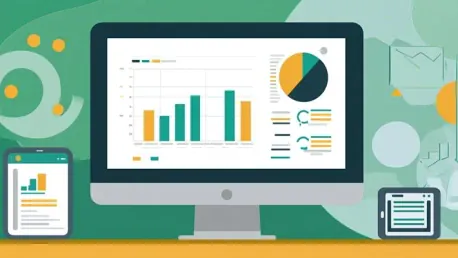The pharmaceutical industry is undergoing a significant transformation driven by the integration of data analytics, reshaping various aspects such as drug discovery, clinical trials, supply chain management, and commercial strategies. This change is not just a trend but a necessity as the industry faces multiple economic challenges, including high inflation, tight labor markets, and global supply chain disruptions. Digital dexterity, leveraging technologies like artificial intelligence (AI), robotic process automation, and big data analytics, is now essential for maintaining competitiveness and achieving substantial growth projected to reach $1.233 trillion by 2025.
Strategic Innovation in Pharma
In an industry traditionally characterized by lengthy processes and exorbitant costs, the need for strategic innovation has never been more critical. As global economic pressures mount, pharmaceutical companies are compelled to find new ways to innovate, streamline operations, and reduce costs. The key to navigating these pressures lies in the effective utilization of data. Companies that skillfully harness their data resources stand to unlock significant growth potential, ensuring they remain competitive in an ever-evolving market.
Role of Advanced Analytics
Advanced analytics, encompassing AI and machine learning, are providing pharmaceutical companies with unprecedented capabilities. These technologies improve operational efficiencies, enhance predictive modeling, and aid in the discovery and optimization of new therapies. For instance, AI-assisted clinical management and drug repurposing are becoming commonplace. The application of analytics in areas like material waste reduction and supply chain logistics illustrates the broad impact of these technologies across the industry.
Challenges in Big Data Analytics
Despite the clear benefits, the adoption of data analytics in the pharmaceutical industry is not without challenges. Companies often face fragmented digital strategies across various business functions, making it difficult to integrate data effectively. Developing the necessary infrastructure to handle both structured and unstructured data is another hurdle. Additionally, companies must navigate the complex landscape of clinical trial data to extract meaningful insights and maintain stringent data privacy standards. Overcoming these challenges requires a well-defined, comprehensive strategic vision and robust implementation plans.
Use Cases for Data Analytics
In practice, data analytics is demonstrating its transformative power through numerous use cases in the pharmaceutical industry:
- Accelerating Drug Discovery: Companies like Novartis and Insilico Medicine are using predictive algorithms to speed up drug design.
- Drug Development and Manufacturing: Pfizer’s collaboration with AWS is optimizing manufacturing processes and anomaly detection using AI and sensor analytics.
- Supply Chain Optimization: Merck’s advanced demand forecasting and inventory management highlight significant cost savings and enhanced efficiency.
- Personalized Medicine: GSK’s initiatives exemplify how analytics can create targeted treatments based on genetic profiles and patient data.
- Sales and Marketing: AI-supported efforts by Pfizer enhance salesforce effectiveness and marketing efficiency.
- Quality Control and Compliance: Sanofi employs natural language generation to ensure regulatory compliance through integrated quality checks.
- Clinical Trials: Predictive modeling optimizes trial design and patient stratification, improving both speed and outcomes of clinical trials.
- Post-Market Surveillance: Utilizing NLP and sentiment analysis, companies can effectively monitor drug safety and efficacy through post-approval feedback.
Ensuring Success with Data Analytics
To harness the full potential of data analytics, a comprehensive strategy encompassing the entire organization is paramount. Key steps include establishing clear data management practices, dismantling data silos, and implementing agile development cycles for use-case projects. Leadership-driven initiatives and a committed change management process are essential to overcoming internal biases and ensuring widespread adoption. The experiences of industry leaders like Novartis, Pfizer, Merck, GSK, and Sanofi illustrate the substantial benefits in operational efficiencies, cost savings, and enhanced clinical outcomes.
Main Findings and Consensus Viewpoints
The consensus within the pharmaceutical industry is clear: data analytics offers invaluable opportunities for innovation, optimization, and enhanced decision-making. Companies that successfully integrate data analytics into their business functions report significant gains in efficiency and effectiveness across operations. The examples of industry leaders highlight the practical benefits and potential financial savings that a well-executed analytics strategy can deliver.
Objective Conclusions
The pharmaceutical industry is experiencing a profound transformation steered by the advent of data analytics. This shift is impacting key areas such as drug discovery, clinical trials, supply chain management, and commercial strategies. It isn’t just a trend; it’s an imperative. Economic challenges like high inflation, tight labor markets, and global supply chain upheavals demand this evolution. Digital agility, enhanced by technologies such as artificial intelligence (AI), robotic process automation, and big data analytics, has become crucial for staying competitive. These technologies enable more efficient operations, improve decision-making processes, and drive innovation. The industry’s growth is projected to soar, reaching an impressive $1.233 trillion by 2025, underscoring the necessity of embracing these digital advancements. As pharmaceutical companies adapt to these changes, they can better navigate the economic pressures and complex market dynamics they face, ensuring they remain at the forefront of medical breakthroughs and continue to deliver value to patients worldwide.









